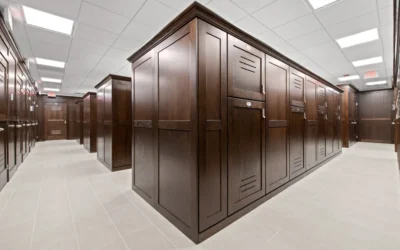Selling tenant insurance provides extra income for self-storage operators, but doing so in some states might get you in trouble with state regulators.
Only 16 states have laws that let self-storage operators obtain licenses to sell insurance policies to tenants, but the national Self Storage Association and its state counterparts are working to change that.
Legislation is pending in eight states — Kentucky, Maryland, Massachusetts, Minnesota, Missouri, Ohio, Pennsylvania and South Carolina — that would create insurance licensing programs for self-storage. Such licensing would enable storage facilities to sell policies over the counter and, in most cases, receive commissions. Insurance agencies that enable operators to sell insurance in states without licensing programs can face stiff fines and other reprimands.
‘A permanent solution’
“Together with the state associations, we are working with both the insurance departments and legislators to find a permanent solution that is good for everyone,” said Tim Dietz, vice president of government relations for the Self Storage Association.
Last year, similar lobbying efforts helped set up self-storage insurance licensing programs in Arkansas, Indiana, Oregon, Tennessee and Virginia. The recent push to establish such laws across the country has come in the midst of increased scrutiny from state insurance regulators. One insurance agency in particular, Bader Co., has been fined in four states since 2006 for selling insurance through unlicensed self-storage operators.
“The Self Storage Association is looking to make it clear that insurance programs can be administered, so we advocate for regulations that recognize and permit storage operators to offer insurance at the counter,” Dietz said.

Legislation is pending in eight states that would create insurance licensing programs for self-storage.
Targeted by regulators
Indianapolis-based Bader is one of the country’s top self-storage insurance agencies, selling tenant insurance in all 50 states.
Over the past several years, Bader has gotten in hot water with a number of state insurance regulators for allowing its policies to be sold by unlicensed storage facilities. Last year in Michigan, Bader was fined $50,000 and required to restructure its self-storage facility insurance program.
The penalty was a drop in the bucket compared with the revenue generated for Bader and participating facilities. From March 2002 to January 2012, self-storage operators in Michigan sold more than 100,000 Bader policies, generating more than $5.4 million in premiums for Bader. In turn, Bader rebated $2.4 million to those facilities.
Tim Parnell, marketing director at Bader, declined to comment for this story.
Fines prompt action
In 2011, New York regulators fined Bader $11,050 for similar practices. In 2006, Bader was fined $33,000 by Oregon regulators $5,000 by Florida regulators.
The SpareFoot Storage Beat searched government records in various states and did not find any instances of other tenant insurance agencies being targeted by state regulators.
The handful of enforcement actions against Bader prompted the company to work with national and state storage associations to support passage of insurance licensing laws across the U.S.
Three of the states where Bader was fined — Florida, Oregon and New York — have since passed laws that establish licensing for self-storage tenant insurance. Facilities that obtain licenses are able to sell tenant insurance policies. In states where such licensing doesn’t exist, insurance agencies that sell tenant insurance directly through facilities run the risk of being targeted just as Bader was. To avoid that, many insurance agencies in those states have facility operators refer tenants to them rather than having the operators sell policies directly.
A different approach
San Francisco-based insurance agency Deans & Homer sidesteps the issue by employing a different approach altogether when it comes to tenant insurance. The agency doesn’t sell policies directly through facility operators at all, whether they’re licensed or unlicensed.
“We took a very different tack a few years ago,” said Scott Lancaster, compliance officer at Deans & Homer.
In addition to selling policies directly to consumers online or over the phone, Deans & Homer offers policies that let operators insure tenants under the facility’s property coverage. For an optional fee paid by the tenant, the operator will assume responsibility for damage to the tenant’s unit under the rental contract. In turn, Deans & Homer covers the operator in the event of such a loss.
Self-storage operators “are just retaining some limited liability within their storage agreements; we back the liabilities assumed or retained by owners,” Lancaster said.
Licensing is all over the map
This business model hasn’t caused any problems with state insurance regulators except in Kentucky, according to Lancaster. That state’s insurance regulator fought the setup for five years, but a court recently determined that it does not constitute an insurance transaction. Deans & Homer is in the process of resuming coverage in Kentucky.
The agency used to sell its policies directly through storage facilities, but stopped doing so when California regulators started questioning the practice in 2003.
Subsequently, California became one of the first states to adopt a storage insurance licensing program, Lancaster said. Even in states where licensing is in effect, Deans & Homer doesn’t sell policies through storage operators. “We found licensing to be kind of problematic from the owner’s standpoint,” Lancaster said.
Licensing laws vary widely from state to state. In Florida, every manager who sells coverage must be licensed, Lancaster said. Other states allow for licensing of an entire business or facility.

At the state Capitol in Boston, the Massachusetts Self Storage Association is seeking passage of House Bill 842.
One state at a time
With most states still lacking programs for licensing of self-storage tenant insurance, some in the industry are working to change that — one state at a time.
The Massachusetts Self Storage Association is lobbying for passage of House Bill 842, which would establish licensing to let facilities sell tenant insurance policies. The bill would permit facility operators to receive commissions from insurance providers as well as pay commissions to their employees.
Michael Kane, legislative affairs director for the Massachusetts association, said he’s unaware of any enforcement actions against tenant insurance companies in his state. Kane said the association is pressing for passage of the legislation to prevent a crackdown from happening.
“It’s just the right thing to do so no one can question us and say we can’t do this,” Kane said. “It is smart to be proactive to preclude that issue from happening.”
In addition, such legislation would boost consumer confidence by establishing an industry standard in Massachusetts, he said. The bill is awaiting action in a Massachusetts legislative committee.
“It is an effort to get everyone under the same type of umbrella,” Kane said. “That way you eliminate rogue facilities from doing kooky things.”
An uphill battle?
These 16 states already have tenant insurance licensing programs: Arkansas, Arizona, California, Florida, Georgia, Illinois, Indiana, North Carolina, New Jersey, New York, Oregon, Tennessee, Texas, Utah, Virginia and Washington.
Deans & Homer’s Lancaster said he thinks passage of licensing laws in the 34 other states will be an uphill battle. That’s because some state insurance commissioners are worried about the proliferation of so-called “limited lines” insurance licenses, like those for tenant insurance.
In addition to protecting a tenant’s belongings in storage, limited-lines policies cover things like rental cars, cellphones and travel. Some state insurance commissioners worry that allowing too many types of “limited lines” will burden state regulators and diminish consumer protection.








